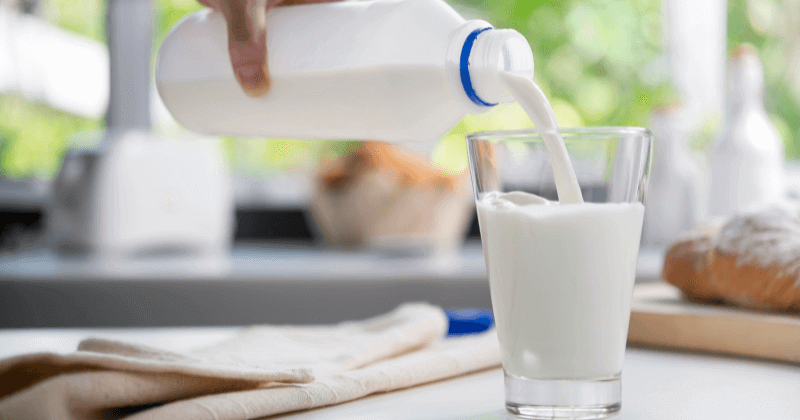Protein In 200 ml of Milk
Milk has been a staple in Indian households for centuries. Whether consumed as a standalone drink, mixed into tea, or used in traditional recipes, milk provides essential nutrients that contribute to a healthy lifestyle.
Among its many benefits, protein content is one of the most sought-after nutritional aspects.
If you’re wondering how much protein is in 200 ml of milk, this guide will give you a clear understanding while focusing on the different types of milk available in India.
Protein in 200 ml Milk
Not all milk is created equal. Depending on the type of milk you consume, the protein content in 200 ml of milk can vary.
200ml of milk contains about 6-7g of protein, providing essential amino acids for muscle growth and overall health.
Here’s a breakdown of the different milk varieties available in India:
🌟 Cow’s Milk
Cow’s milk is the most widely consumed type in India and is packed with high-quality protein.
-
Whole cow’s milk (Full cream): ~6.8g of protein in 200 ml
-
Toned cow’s milk: ~6.4g of protein in 200 ml
-
Double-toned cow’s milk: ~6.2g of protein in 200 ml
🌟 Buffalo Milk
Buffalo milk contains higher protein and fat content compared to cow’s milk, making it a preferred choice for making dairy products like paneer and ghee.
-
Buffalo milk (Full cream): ~8.2g of protein in 200 ml
🌟 Skimmed Milk
Skimmed milk has minimal fat content, making it an excellent option for those watching their calorie intake.
-
Skimmed milk: ~7.2g of protein in 200 ml
🌟 Plant-Based Milk Alternatives
For those who are lactose intolerant or follow a vegan diet, plant-based milk options are available, though they have significantly lower protein content compared to dairy milk.
-
Soy milk: ~6g of protein in 200 ml
-
Almond milk: ~1g of protein in 200 ml
-
Coconut milk: ~1.2g of protein in 200 ml
-
Oat milk: ~2g of protein in 200 ml
Which Type of Milk Is Best for Protein Intake?
If your goal is to increase protein intake, then buffalo milk is the best natural source among dairy options due to its high protein and fat content.
However, if you prefer lower fat, skimmed milk provides a good protein boost while keeping calories in check.
For vegetarians and vegans, soy milk is the best alternative, offering a similar protein level to cow’s milk.
How to Include 200 ml Milk in Your Daily Diet?
Now that we know the protein content in 200 ml milk, let’s explore how you can incorporate it into your diet:
-
Morning Tea or Coffee: Traditional Indian chai with milk is a great way to start the day.
-
Milk with Turmeric (Haldi Doodh): A popular immunity-boosting drink.
-
Milk-based Smoothies: Blend it with bananas, almonds, and honey for a protein-rich drink.
-
Oats or Muesli with Milk: A healthy breakfast option.
-
Milk-based Desserts: Kheer, phirni, and custards can be delicious ways to enjoy milk.
-
Protein Shakes: For gym-goers, adding whey protein to milk makes a powerful post-workout drink.
Milk Protein vs. Other Protein Sources
How does milk compare to eggs, lentils, and meat?
| Protein Source | Protein per 200 ml/Serving | Bioavailability |
|---|---|---|
| Cow’s Milk (200 ml) | 6.8g | High |
| 1 Whole Egg | 6g | Very High |
| 100g Chicken Breast | 31g | Very High |
| 100g Dal (Cooked) | 6-9g | Moderate |
Key Takeaways:
-
Milk is a liquid protein source, easier to digest than meat for some.
-
For vegetarians, combining milk with dal or roti improves protein quality.
Myths and Facts About Milk Protein
✔ Myth 1: Full-Fat Milk Has More Protein Than Skimmed Milk
Fact: The protein content remains almost the same in both; the major difference is fat content.
✔ Myth 2: Boiling Milk Reduces Its Protein Content
Fact: Boiling may alter some vitamins, but protein remains intact.
✔ Myth 3: Plant-Based Milk Provides the Same Protein as Dairy Milk
Fact: Most plant-based milk (except soy milk) has significantly lower protein levels than dairy milk.
Conclusion
Milk is an excellent source of high-quality protein, and consuming 200 ml of milk daily can significantly contribute to your protein intake.
Whether you prefer buffalo milk for higher protein, skimmed milk for a lower-fat option, or soy milk as a plant-based alternative, you can make an informed choice based on your dietary needs and preferences.
For the best results, always opt for fresh, unadulterated milk and pair it with a balanced diet for optimal health benefits.
Are you a fitness enthusiast, a growing child, or simply looking for a nutritious diet? Whichever your goal, adding 200 ml of milk to your daily routine can be a game-changer for your overall health.
